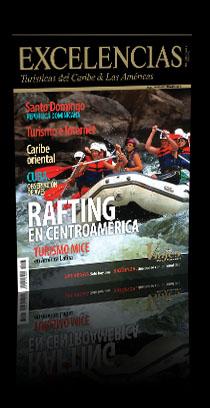Hugh Riley. General Secretary of the Caribbean Tourism Organization (CTO)
Sustainability: The Key to Caribbean Tourism.
Travel and tourism generate a whopping 13 percent of the Caribbean’s Gross Domestic Product (GDP) and provide jobs for nearly 15 percent of the region’s workforce. Its international success is basically propped up by the beauty and conservation of its natural scenery. And it’s in this field where responsibility and sustainability come together as the only way to secure the region’s tourism future. The Caribbean’s economic stability could be in harm’s way and in the face of that reality the concept of sustainable tourism takes a new scope of multilateral political willingness that has managed to map out common-action strategies for the sake of the preservation of natural resources, based on tourism development projects that should not play in the hands of climate change or have predatory effects. During his keynote speech at the recently-concluded 19th Inter-American Travel Congress held in San Salvador, CTO secretary general Hugh Riley reminded attendees that tourism in the Caribbean –a region that’s home to 40 million people- accounts for 1 out of 9 jobs and represents up to 70 percent of the GDP for some of CTO’s member states, an organization that currently gathers 32 governments and a number of entities from the private sector. Sustainable tourism –included in the organization’s statues for over two decades- is defined within the CTO strategy as “the optimal use of natural, cultural, social and financial resources for the sake of national development and on the basis of equity and self-sustainability in an effort to deliver a unique travel experience and to increasingly improve the population’s life quality through the association of the government, the private sector and the communities,” Mr. Riley went on to say. In his remarks, Mr. Riley recalled a Cree tribe quotation a friend of his recently sent him: “only after the last tree has been felled, only after the last river has been poisoned, only after the last fish has been caught, only then we will realize that money is not edible.” When comparing statistics with other travel destinations worldwide, it meets the eye that the Caribbean is the world’s most tourism-dependent region. “This means that any challenge threatening the sustainability of the travel industry is a more severe threat to the Caribbean than to any other region on the planet,” the CTO Secretary General added. These challenges –he explained- can be either natural or created by man. “Some of them are beyond our control, but others are within our possibilities to mold them and turn them into opportunities and advantages. “Everybody in this industry is aware of the perils posed by floods, hurricanes, volcanic eruptions and earthquakes. We also know the dangers brought about by crime, social and political instability, terrorism, taxes and contagious diseases,” said the CTO official as he called on the need and importance of having mechanisms in place to cope with natural disasters, to monitor the effects of climate change and to protect ecosystems. This means to fight against ignorance, to educate our populations to the true potentials of this marvelous resilient, yet incredibly vulnerable industry. On this particular matter, Mr. Riley commented: ““We cannot meaningfully discuss the involvement of our communities in tourism without accepting our fundamental responsibility to teach them about tourism.” He stressed that education did not mean “creating a tourism practitioner out of every citizen in the Americas” but that the children in the hemisphere must be taught from an early age, the role they play in tourism. “I’m suggesting that an essential step to sustaining our tourism industry lies in reaching into our primary and secondary schools, and unleashing the power of those young, creative minds at a very early age. Giving them a clear understanding of the role they play in the success of this industry”.























































































































